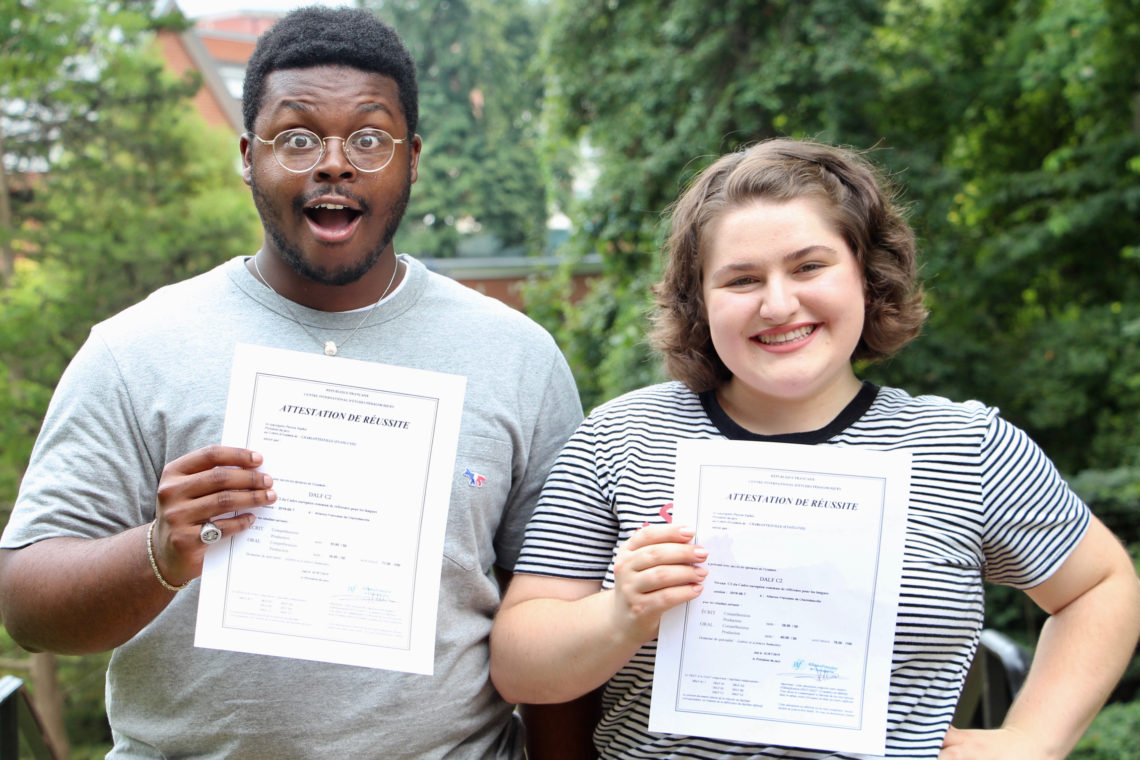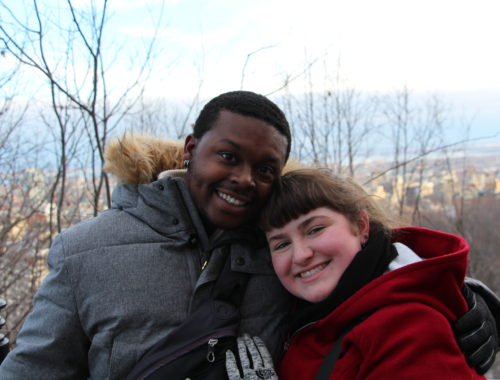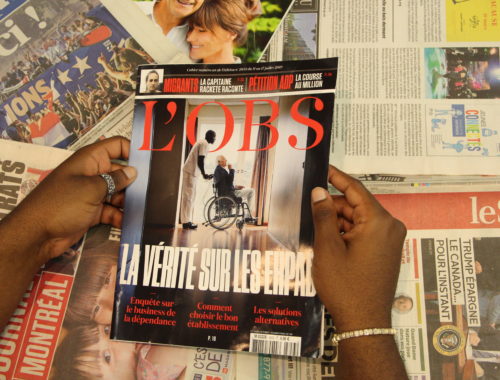
DALF C2 Test Experience and Five Insider Tips
What is the DALF C2?
The DALF C2, or Diplôme Approfondi de Langue Française Niveau C2, awarded by the French Ministry of Education, is the highest achievable credential for French as a foreign language. C2 is the sixth and top level of language ability in the CEFR, or Common European Framework of Reference for Languages. When we took the test in 2019, candidates were able to choose between two general exam subjects, Lettres et sciences humaines or Sciences, according to their personal preference. Candidates are no longer able to choose a domain.
The DALF C2 evaluates reading comprehension, writing skills, listening comprehension, and speaking skills. Both the reading/writing section and the listening/oral section are worth 50 points. To pass, candidates must attain a minimum score of 10/50 per section and 50/100 overall.
The listening/oral section lasts approximately 2 hours. Candidates are permitted a monolingual French dictionary and note taking materials. First, we were given a choice between two specific subjects for the listening and oral section of the exam that fell within our preferred general domain of either Lettres et sciences humaines or Sciences. Then, we listened to a recording of approximately 15 minutes twice with a 3-minute break in-between. Afterwards, we had 1 hour to prepare for the oral examination. Candidates begin by giving a 5-to-10-minute general summary of the recording. Next, candidates assume a character role and give a 10-minute speech that combines ideas from the recording, opinions based on their character role, and personal insights. Finally, while still in character, candidates participate in a debate with the jury.
The reading/writing section lasts 3 hours and 30 minutes. Candidates are permitted a monolingual French dictionary and note taking materials. Candidates are provided with several theme-based documents that they must read and synthesize into a well-structured article, editorial, report, speech or other structured document. This written synthesis should include approximately 2,000 words, but no less than 700, and should respond to one of two prompts.
Why take the DALF C2?
TAPIF only requires a B1 level, most French universities accept a B2 or C1 level, and very few other opportunities absolutely necessitate a C2 level. Consequently, Jalen and I initially planned to take the DALF C1 and were very confident that we would pass. After careful consideration of our education, abilities, and prospective plans, however, we decided that passing the DALF C2 could potentially give us a leg-up in the future and would certify for life our French-language abilities. We also knew that if we passed the C1, we would eventually want to try to pass the C2, even if only for vanity’s sake. For these reasons, we decided to go for the DALF C2.
Other French-language tests exist, including the TCF, or Test de connaissance du français, which grades French-language proficiency from A1 to C2. In contrast with the DILF, DELF, and DALF, the TCF cannot be failed. Rather, the results indicate where a candidate falls on the CEFR. However, the results are only valid for two years. If you only need the results to be valid for a short period of time, for example, to gain entry to a French university, the TCF might be right for you. Because the two-year expiration wouldn’t work as well for us as a life-long certification would, we knew that the DALF C2 was the right test to take.
Registering for the DALF C2
The first step in registering for the DALF C2 is choosing the closest approved examination center to you from the many locations around the world. Then, visit your examination center’s website to sign up for a test date at your desired location. Don’t put off choosing a location and date, as many examination centers only proctor the test a few times per year. When we took the test, we chose between Lettres et sciences humaines and Sciences for the subject of our exam, entered our personal information, and paid online. Because of our liberal arts education, double majors in International Affairs and French, and personal interests, we went with Lettres et sciences humaines for our exams. After registering, we immediately received a confirmation email from the Alliance Française and a receipt of payment. Four days later, we received a follow-up email with the exact times of our oral and written examinations and instructions on what to bring to the examination center.
The cost of taking the test varies. Check your examination center’s website to find out how much taking the DALF C2 will cost for you. We took our exam at the Alliance Française in Charlottesville, Virginia and each paid $220, a somewhat hefty price tag for two recent college graduates. Keep in mind, however, that because the results are valid for life and recognized internationally, you should consider it an investment. We knew that there was no better time to take the exam and were sure we would thank ourselves down the road when we didn’t have to get recertified.
Preparing for the Exam
We registered for the DALF C2 about two weeks before the exam was scheduled to take place. Neither of us had given much thought to exam preparation – we had just capped off four years of college-level French study by writing and presenting our theses to the French department – and we were very confident in our abilities. We knew, however, that practicing our off-the-cuff speaking skills, familiarizing ourselves with the exam format, and doing a few trial runs would be beneficial to us.
If you have less experience with the French language, or simply do not feel as confident in your abilities, we recommend starting your preparation well before two weeks in advance. Many examination centers also offer preparatory classes tailored to the exam format for which candidates can register and pay online. Numerous online courses, modules, and videos that claim to prepare candidates for the exam exist as well. Lastly, there are physical reference books and workbooks that can be purchased and used for studying for the exam. We, however, did not use any of these resources and cannot attest to their effectiveness. Instead, we made and followed our own schedule of exam preparation at home for free.
Each evening for two weeks, we dedicated approximately one hour to preparing for the DALF C2. For the first few days, we listened to sample recordings, watched videos of candidates giving their oral presentations, and scrutinized their score sheets. We took note of what made candidates gain or lose points in certain sections and began to get a feel for the test format. We noticed, for example, that candidates who relied too heavily on written notes and candidates with a monotone voice did not score as well as those who made eye contact with the jury and those who spoke with lively intonation.
For the next few days, keeping in mind what we learned from the recordings, videos, and score sheets, we listened to more sample DALF C2 recordings. We practiced taking notes on what we heard in real time, rehearsed giving 5-to-10-minute summaries and 10-minute role-specific speeches to each other, and pretended to be each other’s jury members by thinking up questions and counter arguments for the other to tackle. Here, we learned that Jalen needed to pare down his summaries and speeches to fit into the 10ish minute constraint while I needed to add more detail to my summaries and speeches to reach the minimum time limit.
Next, we watched YouTube videos that interested us then summarized and synthesized what we had learned via conversation. We chose to watch videos detailing the European elections to get comfortable speaking in-depth about topics that require retention and reproduction of newly learned information. Since we knew our DALF C2 topics could be about anything related to Lettres et sciences humaines, we felt these videos would help prepare us.
Finally, we practiced the written portion of the exam using sample DALF C2 topics. Because we had written numerous essays, analyses, and exams in French, we knew we didn’t need to write a 3-hour sample to practice. Instead, we gave ourselves 1 hour to review the sample documents, choose a prompt, and write a detailed outline. After the hour was up, we discussed our ideas, critiqued each other’s outlines, and thought about what we would do differently on test day. All together, we went through this outline writing process with two different sample topics and felt well-prepared.
Our exam preparation worked really well for us. Our main goal was to ensure that we felt confident in the format of the test and our ability to give the proctors what they wanted. Our two weeks of speaking and writing practice tailored to the DALF C2 ensured that there were no surprises on test day.
Exam Day
The first order of business was getting the day off of work. Because the exam took place on a Friday and we had to drive about 2 hours to get to the nearest Alliance Française, there was no way to avoid missing a work day. Jalen’s oral exam was scheduled for 8:30 AM and mine was scheduled for 9:30 AM. Since we had been instructed to arrive at least 10 minutes early for administrative purposes, we left Fredericksburg at 6:00 AM and began the drive to Charlottesville.
Jalen and I quickly realized that we were the only two candidates for the DALF C2 exam that day and remarked that the Alliance Française was much smaller than we had expected. It was comprised of a lobby where we checked in, a library room where we listened to the recording and prepared for the oral exam, a classroom where we presented our oral exam, and a classroom where we took the written exam.
Upon arrival, Jalen showed his ID and signed a document before being taken back to begin his exam. I waited in the building for slightly under an hour before returning to show my ID, sign, and begin my exam. We took the listening and speaking portion of the exam separately and it went exactly as planned for both of us.
First, we were asked to choose between two topics for the listening and speaking session. We were then asked to choose which role we would like to play for the speech and debate portion. After informing the proctor of our choices, the exam began. We were provided with a monolingual French dictionary, a few pieces of unlined paper, and two pens. The recording played once, there was a 3-minute break in-between, and then it played again. We had one hour to prepare to summarize the recording, play our roles, and debate in front of the jury. A test proctor wrote the start and end times of this portion of the exam and placed a clock on the whiteboard so that there was no confusion. There was at least one test proctor in the room with us at all times.
When the hour of preparation time was up, we moved to another room and sat facing a jury of two. When we were ready, we gave our summaries and our role-play speech. The jury took notes while listening and both members made eye contact throughout the process. When it was time to debate, the jury took turns asking questions, asking for clarification, and challenging points we had made. There was a clock on the table for us if we wanted to know how long we had been talking and for the jury to reference. True to our personalities, Jalen used the clock and knew exactly how long his summary, speech, and debate were while I couldn’t bear to look at the clock at all. After the oral exam was over, we had a break before the written portion.
We were both scheduled to take the written exam at 12:00PM, so we went back inside at around 11:50AM to show our IDs and sign again. In contrast with the first half of the exam, we took the writing portion at the same time and in the same room. We were seated at separate tables, given monolingual French dictionaries, a few pieces of unlined paper, test packets, and two pens each. We were told that for the first hour of the 3 and half hour exam we would not be allowed to leave the room, but after that hour passed, we could ask to use the restroom or to get water. As before, a test proctor wrote the start and end times of this portion and placed a clock on the whiteboard so that there was no confusion. There was at least one test proctor in the room with us at all times.
The writing section’s test packet included the documents we needed to read and synthesize, the two prompts, and a few sheets of lined paper. As we had practiced, we read the documents, wrote detailed outlines, and then completed our essays. Both of us used all the lined paper in the test packet and had to ask for more, which the test proctor brought us without any trouble. We both used the full 3 hours and 30 minutes to complete our essays.
At the conclusion of the exam, the test proctors wished us well and said to expect an email with the test results within two weeks. We thanked them for their time and went on our way, extremely relieved that the long day was finally over!
Results
18 days after our test, we received emails at around 10:00 AM from the Alliance Française with “Results DALF C2” in the subject line. The results themselves were in an attached PDF scan of our certificates. We both passed!
Jalen’s Scores:
Writing: 35/50
Speaking: 36/50
Overall: 71/100
Maria’s Scores:
Writing: 38/50
Speaking: 40/50
Overall: 78/100
Candidates don’t ever get to see their score sheets from exam day, so there’s no way to know where exactly we lost points or what gave us an extra boost. Given that a 10/50 is a successful score for a single category and an overall 50/100 is a passing score, we were really excited to have both scored well above those thresholds. Most of all, we were relieved that we had passed and that we could use these results to prove our language ability for the rest of our lives!
Tips to Remember
Choose the exam that you know you will pass. If you want to take the DALF C2 but don’t feel that your abilities are up to par, take a lower level exam or wait until you are ready for the C2. Alternatively, if you don’t need results that last longer than two years, take the TCF. That way, you can’t fail the exam and you’ll be sure of your level if, in the future, you want to take an exam that will certify you for life. No matter what you decide, you should feel confident in your choice of exam.
Wear a wristwatch on the day of the exam. Although there was a clock in every room at our examination center, we find that it’s quicker and easier to glance down at our wrists than to look up at a clock on the wall. Though it may not seem to save much time or effort, saving even a few seconds during an exam with such strict time constraints can be really helpful.
Eat before your exam and bring lots of snacks. It was hard for us to coordinate a hearty breakfast between waking up early, driving for two hours, and controlling our exam day nerves. By the time I finished my listening and oral examination, I was really hungry. Luckily, I had snacks to eat during my break, but it wasn’t enough to stave off the headache I had gotten from eating too little. Make sure you eat a filling meal and bring snacks so that you feel your best on exam day.
Turn off your phone and leave other electronics at home. Candidates may not have phones, smart watches, tablets, laptops, cameras, or any other electronic device on their person at the time of the exam. If you can, leave these items at home. If not, ensure you have turned the devices completely off and put them away. Our proctors let us know that if a phone even vibrates during the exam, candidates could be disqualified. Don’t risk it!
Don’t even think about cheating on the exam. If candidates are caught cheating in any way, they are immediately disqualified and dismissed from the exam. Paperwork is sent directly to France to document the infraction and candidates are barred from taking any certification exam for 5 years. If you have chosen the exam that is right for you, cheating should be the furthest thing from your mind. Cheating to pass an exam you aren’t ready to take can only hurt you.
We hope sharing our experience with passing the DALF C2 will help other potential candidates feel more comfortable and confident about the process. If you’ve taken a certification exam or have questions about our experience, let us know!
You may also like…
Improve your French easily by watching this video!
You May Also Like

Why Studying Abroad in Canada Might be Right for You
September 18, 2019
Five Reasons the News is a Great French-Learning Resource
October 1, 2019


10 Comments
Isa
Hi,
Thank you so much for such useful info 🙂
I took C1 test years ago and I now I’m planning to “passer le Dalf C2”
BTW, I also took the C2 English exam and let me tell you is much more difficult in comparaison, not because the level, ’cause is basically the same, the issue is this part called “use of English” which just focuses on grammar and vocabulary.
Isa
Jalen & Maria
Good luck with your DALF C2! About the English C2, that does sound difficult. We are often thankful that English is our native language, it isn’t easy!
Andros
Hello there,
Not long ago I took my C2 exam and had a good score (39) in the compréhension et production orales but nearly failed the compréhension et production écrites section. Although it is obvious that those marks are not indicative of my true writing abilities and I passed, I would like some insight into what could have led to such a poor mark. The instruction of the written section said to make a submission to a journal, for or against AI at the workplace. Did I need to include formalities such as address and what not? I just went straight ahead with my title, wrote meticulously, and then signed off. Anything I missed?
Jalen & Maria
Hello, Andros. It is difficult to say what exactly caused you to lose points without being able to see the corrections. It is quite possible that the mise en page was not to the grader’s standards, but it could have also been a number of other things (after all, if you knew you were making grammatical or punctuation mistakes, you wouldn’t have left them in!). The most important part is that you passed your exam. We suggest you poke around on this website for more insight into the test.
Maurice
Jalen & Maria,
Can you take DALF on a computer? And can you use spell check?
Maurice
Jalen & Maria
Hello, Maurice. To our knowledge, no. The DALF C2 is a written and oral exam done the old-fashioned way! Since the written portion is done with pen and paper, the only spell checking available is a French-language dictionary (no English translations, just French words and French definitions). This being said, the exam sections are timed, and the dictionary is there for when you really need it. Otherwise, it will be more of a hinderance than a help, because constantly spell checking can waste valuable time during the exam. Hope this helps clear things up!
Kate
Very interesting.
I am taking C2 May.
Don’t feel too prepared yet but hope I will then.
Thanks for the tips.
Jalen & Maria
Thanks for reading, Kate! Good luck on your test and bonne préparation ! We’d love to hear about your results once you get them back. 😊
Francesca
Bonjour, Salut!
I am Francesca Greco, a student from Uc Berkeley (Mechanical Engineering) and Polytechnic of Milan, Masters Level. I am preparing for DALF C2 expected on 25th AUgust in Paris and at the moment I am living in Paris. I already got C2 in English through CPE Cambridge when I was 17 and later through TOEFL iBT.
I would love to ask you if you can send me whatever exams / documents you have been using directly to my email address?
I really appreciate it and would definitely take you to a Boulangerie later in case to meet up in Paris if you’d like!
I am also studying for my Engineering exams expected on early September,
Looking forwrad and have a good day ahead,
Yours faithfully
Jalen & Maria
Hi there, Francesca. All of the materials we used to study that are still available are linked here in the article. Best of luck for your exam and engineering studies!